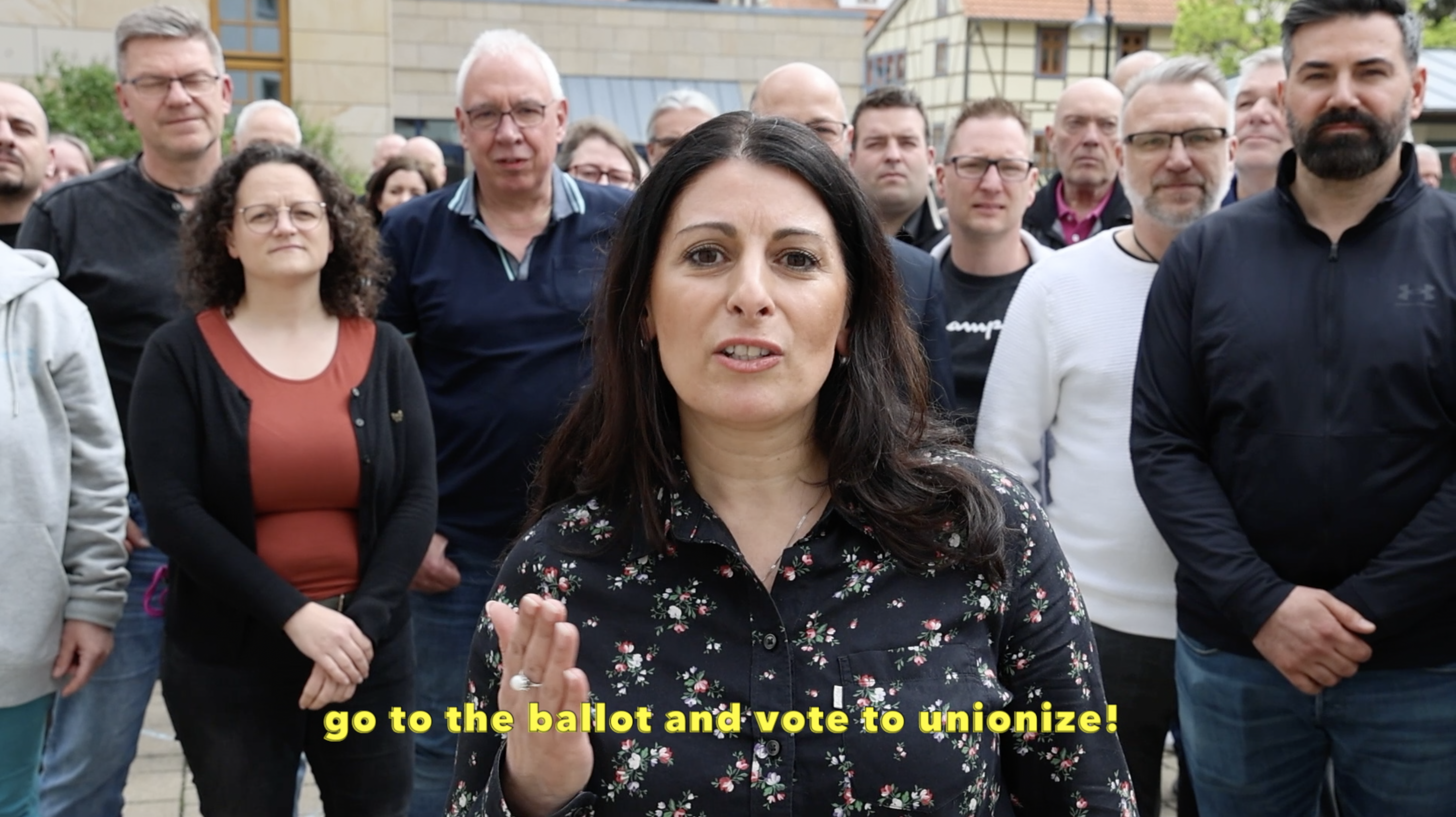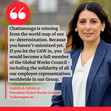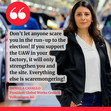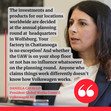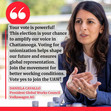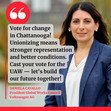crucial election
Cavallo speaks out on Chattanooga - encourages backing UAW
13.04.2024 | President of Global Works Council sends message of solidarity
(zur deutschen Version hier entlang - German version click here)
Wolfsburg/Chattanooga - In the long-running conflict over whether to start co-determination at VW's Chattanooga plant in the US, Volkswagen's top employee representative has adressed the workers with an recommendation to back the UAW in the upcoming election. In her function as as a trade unionist and President of the European and World Works Council, Daniela Cavallo said in a video message sent to the workforce in Tennessee at Saturday (April 13): "You in Chattanooga are missing from our international committees. So please, exercise your right to vote, go to the ballot and vote to unionize!"
For her statement the Chairwoman of the in Germany powerful Works Council received support from her local IG Metall group at the main plant in Wolfsburg. At a closed meeting, around 100 metalworkers lined up next to each other to form the letters of the US sister union UAW. The two-minute video message can be viewed here (click to open), including English subtitles.
The story behind Cavallo‘s message: Next week (April 17 - 19), the VW workforce from the factory in Tennessee will be called upon for the fourth time to vote on whether they want to be represented by the powerful US auto trade union UAW in the future. The UAW is strong with the established domestic manufacturers in the USA, but not with the German and other foreign manufacturers, many of whom have located in the US southern states.
In Chattanooga, the UAW had already made two major attempts in the past to win the workforce's mandate. Both times, in 2014 and 2019, the trade union failed. In a smaller-scale attempt in 2015 to initially organize only a specific group of skilled workers, the UAW won clearly, but a following legal dispute over the election dragged on for so long that the 2019 ballot overtook the 2015 attempt. However, all previous elections in Chattanooga have been torpedoed by massive anti-union campaigns.
Interested parties, particularly from the strong Republican political circles in the southern US-states, created a mood against the UAW. There was real scaremongering. Law firms were commissioned with union-busting. Large billboards in the plant’s neighborhood, for example, were predicting the death of the factory if the UAW got a foot on the shop floor. The most recent attempt at unionization ended extremely narrowly to the disadvantage of the union: the UAW was only 29 votes short of victory (776 workers backed the attempt, but 833 voted it down).
Recently, however, the UAW has been riding a wave of success. At the so-called Big 3, which in the USA stands for the three top dogs GM (General Motors), Ford and Chrysler (Stellantis Group), the UAW recently achieved historically high wage settlements. Put simply, the US union achieved a whopping 25 percent increase in income over a period of four years.
Now the UAW is also seeking the approval of the workforce in Chattanooga in order to obtain a mandate to collectively represent the interests of employees in the US factory from now on. The co-determination systems in the USA and Germany have some parallels, but overall a comparison is difficult, partly due to major historical differences (see info box below).
In what is now the fourth attempt by the UAW in Chattanooga, the public debate has now reached superlatives. Even for long-time observers of the conflict over co-determination at the US plant, it seems strange that none other than US President Biden is now speaking out on the issue. His position on the UAW's fight for Chattanooga was published as a separate press release from the White House. Headline: "Statement from President Joe Biden on the Volkswagen Plant in Tennessee" (click here for the original statement).
By the way: Biden's challenger Donald Trump did not shy away from superlatives on the subject. On his social media service "Truth Social", Trump called UAW President Shawn Fain "a Weapon of Mass Destruction an Auto Workers and the Automobile Manufacturing Industry in the United States"(read the post here).
On Saturday morning (20 April) German time, it will be clear whether the UAW has been able to capitalize on its recent wave of success and can also organize Chattanooga after winning the election.
_________
Volkswagen has many special characteristics that are difficult for outsiders to understand without in-depth knowledge of the company's history. So here is a brief summary:
Volkswagen is a company with a very special history. This includes not only the fact that VW was founded by the Nazis - Hitler laid the foundation stone for the Volkswagen plant in today's Wolfsburg, the Group headquarters, and during World War II VW used forced labor. The historical roots also include the fact that the money to build the Volkswagen plant came from the assets of the German trade unions, which had been expropriated by the Nazis.
After the war, the factory fell under British control. The future of the plant was unclear for a long time - dismantling was one of the options. In the end, however, the British decided to allow the factory to continue as a "democratically controlled industrial enterprise" with a model function for the future post-war Germany. One of the guiding principles was that labor and capital should have equal rights at VW.
The share capital was therefore placed in public ownership. Volkswagen is now a listed company. However, a stake with a de facto blocking minority for important decisions is still in public hands, namely in the state of Lower Saxony, the home of VW, where Wolfsburg and other VW plants with the oldest history are located. The German VW Law protects this situation, which is unique in the stock market landscape of companies listed on the German DAX index. In 2013, the European Court of Justice upheld the VW Law. Its core is paragraph 4, which states that what is possible in other stock corporations with a three-quarters majority is not possible at Volkswagen without the consent of the state of Lower Saxony. And: neither a new plant may be built nor an existing one relocated without the permission of the employee representatives on the Supervisory Board, Volkswagen's highest controlling body.
All these special features and the co-determination culture that has grown at VW over decades ensure that no groundbreaking decisions can be made without a consensus with the employees and the state of Lower Saxony. Co-determination at Volkswagen is correspondingly self-confident, but also aware of its great entrepreneurial responsibility.
Info box:
In Germany, with its federal law „Betriebsverfassungsgesetz“ (Works Constitution Act), co-determination within the company is most comparable to parties that compete for the favor of the voters at a factory every four years. Trade unions such as IG Metall often run as a list for those Works Council elections, but personal elections are also common. Individual candidates can also enter the race. This is how the Works Council is made up. At the German VW sites, the situation is very clear, with IG Metall recently winning well over 90 percent of all 377 Works Council mandates. A Works Council regulates key issues within the company, for example via works agreements, so called „Betriebsvereinbarungen“.
Collective bargaining, on the other hand, requires the status of a party backed by German federal law. At Volkswagen AG, where a company collective agreement applies, this is done for the employee side by IG Metall. Strictly speaking, IG Metall only concludes collective agreements for its members, who have a very high level of organization at Volkswagen compared to the rest of the industry.
Overall, a distinction is made in Germany between co-determination outside the company (by trade unions) and co-determination within the company (by Works Councils). However, there are larger overlaps, for example in collective bargaining or the shop stewards, who act as a link between the trade union and the Works Council members.
The recognition of trade unions as collective bargaining partners in Germany is over 100 years old. The agreement on this has its roots in revolutionary times, when the capital's side feared the expropriation of their factories.
Free collective bargaining was then banned during the Nazi era. This is why it was so important after World War II to establish democracy in the workplace and make collective bargaining autonomy the cornerstone of the German working world. It has now been in existence for 75 years and is therefore older than Germany's constitution.
In the US, on the other hand, many things are different - including co-determination. An economic elite with often anti-union multi-billionaires such as Tesla boss Elon Musk stands in contrast to millions of employees who can only make ends meet with several jobs, facing completely inadequate social insurance and whose children's future prospects depend even more than in Germany on the origin of their parents.
In the US, shop stewards perform the tasks that Works Council members do in Germany. Whether a company has co-determination initially depends on whether the majority of employees decide to back a trade union. Only then further steps are possible. The UAW at VW in Chattanooga now again aims at fundamental recognition in the factory, producing the all electric ID.4, Atlas and Atlas Cross Sport.
The employee side at Volkswagen bundles its international co-determination beyond the German Works Constitution Act in its so called European and Global Works Council. The top body there is the Executive Committee, whose President is Daniela Cavallo, aged 49.
The most recent Executive Committee meeting at the end of 2023 in Poznan, Poland, was attended by the chairpersons of the employee representatives of 13 brands and companies as well as the regions of North and South America, Africa and Asia. Chattanooga cannot delegate a member to the Global Works Council, because the factory does not yet have the necessary co-determination structure. Nevertheless, committed trade unionists are of course already active in Chattanooga and its UAW unit local 42.
At the meeting in Poznan, the Executive Committee dealt in detail with the situation still free of co-determination in Chattanooga. With a view to the joint agenda for 2024, the committee stated that it would work towards the necessary neutrality of the company should the UAW make another attempt to hold an election in Chattanooga.

